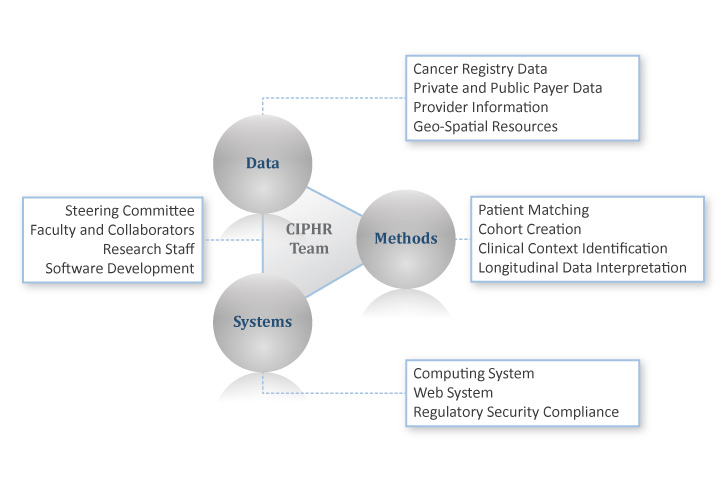

When UNC Lineberger leaders approved the use of the University Cancer Research Fund to launch the Integrated Cancer Information and Surveillance System in 2010, the vision was to develop a tool that facilitated “big data” population-based cancer research.
“Population health research is extremely data intensive, and aggregating and analyzing data from different organizations and platforms can be a significant barrier for scientists,” explained Chris Baggett, PhD, the program’s faculty director. “The investments UNC Lineberger and the university made were instrumental in expanding our capabilities to ask and investigate some challenging questions. It provided the foundation on which to build a nationally unique research tool.”
Academics and policymakers are now using the data resource to knit together data from multiple public and private sources, including the North Carolina Cancer Registry and public and private health insurance claims, to examine a wide range of complex issues tied to improving cancer outcomes in North Carolina, such as what treatments are most effective or what geographic or economic factors affect prognosis.
The program underwent a notable change this summer when its leadership decided a new name was needed. Though no one confused the program with the radical militant group ISIS, the ICISS acronym was pronounced the same way. Beginning July 1, the program was formally renamed the Cancer Information & Population Health Resource, or CIPHR.
“You get people’s attention rather quickly when you start your talk explaining that you are an organization known as ICISS,” Baggett said. “But it became quite clear to our team that we needed to switch to a new name that is more befitting for an organization that is doing exceptional research focused on benefitting human health.”
CIPHR, which is part of UNC Lineberger’s Cancer Outcomes Research Program, has grown significantly in recent years. The number of researchers using the data has increased, and the CIPHR team has expanded to include system programmers, statisticians, clinicians, health services researchers and epidemiologists.
Baggett said CIPHR now has access to information on more than 500,000 cancer patients in the state, 80 percent of which are linked to insurance claims data, and he added plans call for expanding CIPHR’s functionality.
“The next big development for CIPHR will be to effectively and securely link our core data to electronic health records and genetic data in the UNC Health Care system,” said Baggett. “Connecting these data sets will allow researchers to take an unprecedented look at an even wider variety of factors that might influence cancer incidence or impact the delivery, cost and quality of cancer care. By better understanding this information, we put ourselves in a position to improve outcomes for people who have cancer in North Carolina.”
